A thin slice is cut out of a glass cylinder along a plane parallel to its axis. The slice is placed on a flat glass plate as shown in Figure. The observed interference fringes from this combination shall be
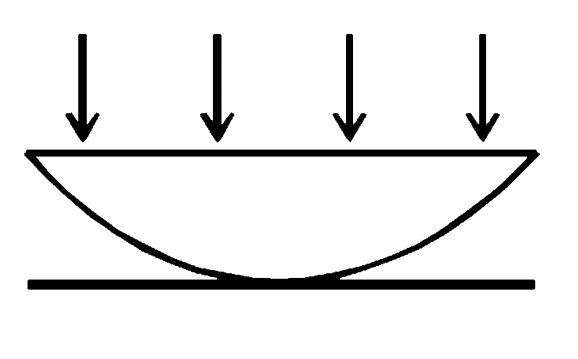
straight
circular
equally spaced
having fringe spacing which increases as we go outward
The correct Answer is:a
Locus of equal thickness are lines running parallel to the axis of the cylineder. Hence straight fringe will be observed.
Topper's Solved these Questions
- WAVE OPTICSBOOK - CENGAGE PHYSICSCHAPTER - WAVE OPTICSEXERCISE - MCQ
2 Videos
- WAVE OPTICSBOOK - CENGAGE PHYSICSCHAPTER - WAVE OPTICSEXERCISE - Linked Comprehension type
5 Videos
- WAVE OPTICSBOOK - CENGAGE PHYSICSCHAPTER - WAVE OPTICSEXERCISE - True/False
2 Videos
- THERMODYNAMICSBOOK - CENGAGE PHYSICSCHAPTER - THERMODYNAMICSEXERCISE - QUESTION BANK
34 Videos
- WAVESBOOK - CENGAGE PHYSICSCHAPTER - WAVESEXERCISE - QUESTION BANK
38 Videos
Similar Questions
A point sources S emitting light of wavelength 600nm is placed at a very small height h above the flat reflecting surface AB(see figure).The intensity of the reflected light is36% of the intensity.interference firnges are observed on a screen placed parallel to the reflecting surface a very large distance D from it.
(A)What is the shape of the interference fringes on the screen?
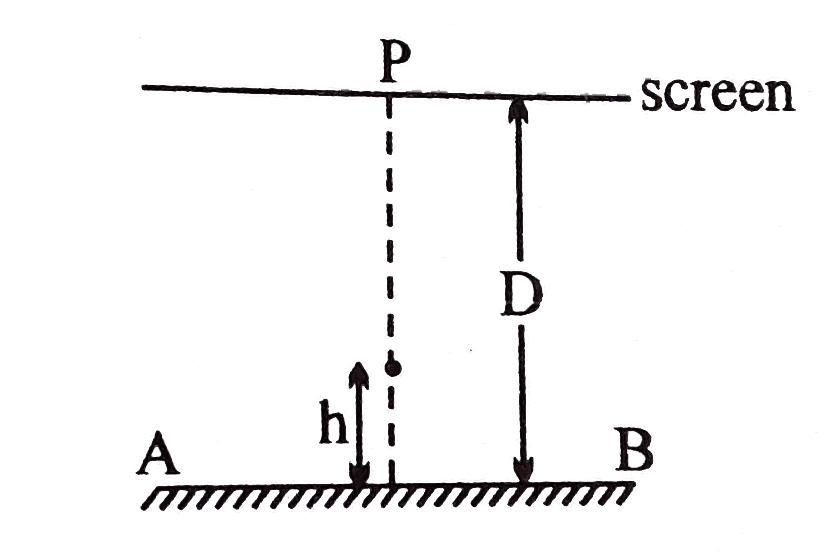
(B)Calculate the ratio of the minimum to the maximum to the maximum intensities in the interference fringes fromed near the point P (shown in the figure) (c) if the intenstities at point P corresponds to a maximum,calculate the minimum distance through which the reflecting surface AB should be shifted so that the intensity at P again becomes maximum.
View SolutionA convex lens is cut in half along its principal axis and the two halves are separated by a distance of 12cm. An object is placed 6cm in front of the lens as shown in Figure., Two sharp images are formed on the screen placed 80cm from the oject. What is the focal length of the lens?
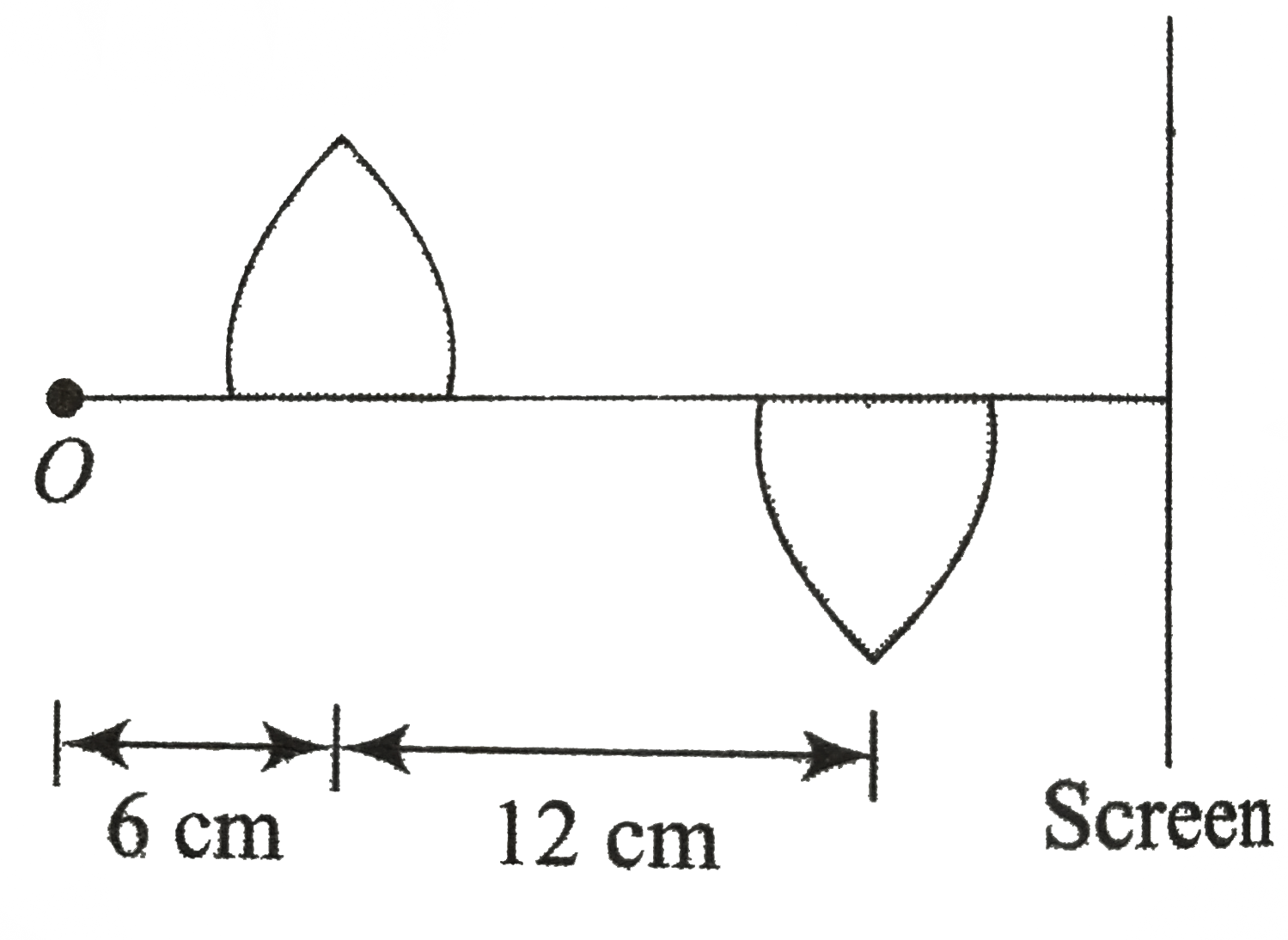
View Solution
Knowledge Check
A thin slice is cut out of a glass cylinder along a plane parallel to its axis. The slice is placed on a flat glass plate with the curved surface downwards. Monochromatic light is incident normally from the top. The observed interference fringes from the combination do not follow on of the following statements.
AThe fringes are straight and parallel to the length of the plece.BThe line of contact of the cylindrical glass pice and the glass plate appears dark.Cthe fringe spacing increases as we go outwards.DThe fringes are formed due to the interference of light rays reflected from the curved surface of the cylindrical piece and te top surface of the glass plate.Assertion: A glass hemisphere is placed on a flat plate as shown. The observed interference fringes from this combination shall be circular.

Reason: In all cases fringes are circular.A(a)If both Assertion and Reason are true and the Reason is correct explanation of the Assertion.B(b)If both Assertion and Reason are true and the Reason is not the correct explanation of the Assertion.C(c) If Assertion is true, but the Reason is false.D(d) If Assertion is false, but the Reason is true.A lens is cut from from the optical centre along the principal axis and the two parts of the lens are placed sideways as shown in figure. Then the new focal length of the combination :
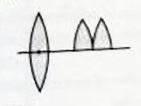 ARemain the sameBBecomes doubleCBecome halfDBecome triple
ARemain the sameBBecomes doubleCBecome halfDBecome triple
The length of a magnet is large compared to its width and breadth. The time period of its oscillation in a vibration magnetometer is T. The magnet is cut along its length into six parts and these parts are then placed togather as shown in the figure. The time period of this combination will be

View SolutionA point sources S emitting light of wavelength 600nm is placed at a very small height h above the flat reflecting surface AB(see figure).The intensity of the reflected light is36% of the intensity.interference firnges are observed on a screen placed parallel to the reflecting surface a very large distance D from it.
(A)What is the shape of the interference fringes on the screen?

(B)Calculate the ratio of the minimum to the maximum to the maximum intensities in the interference fringes fromed near the point P (shown in the figure) (c) if the intenstities at point P corresponds to a maximum,calculate the minimum distance through which the reflecting surface AB should be shifted so that the intensity at P again becomes maximum.
View SolutionThe two surfaces of a biconvex lens has same radii of curvatures . This lens is made of glass of refractive index 1.5 and has a focal length of 10 cm in air. The lens is cut into two equal halves along a plane perpendicular to its principal axis to yield two plane - convex lenses. The two pieces are glued such that the convex surfaces touch each other. If this combination lens is immersed in water (refractive index =43 ), its focal length (in cm ) is
View SolutionThe concave surface of a thin concavo -convex lens of glass of refractive index1.5has a radius of curvature of 20cm.The concave surface has a radius of curvature of 60cm.The covnex side is silvered and placed on a horizontal surface as shown in the figure.
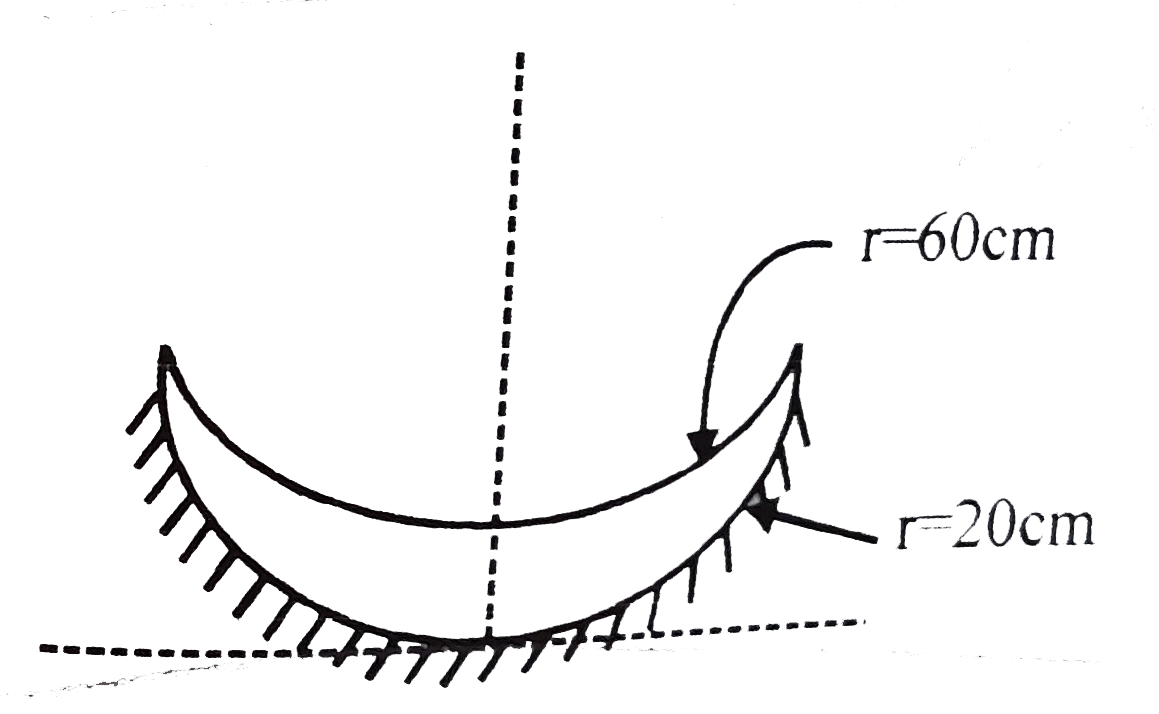
A small object is placed on the principal axis of the combination,at a distance of 30cmin front of the mirror.The magnification of the image is
View SolutionA certain transmission line (very long) is constructed from two thin metal plates (parallel to each other) of width b, which are separated by a very small distance ‘h’ lt lt ‘b’ . The current travels down one strip and back along the other, and it is distributed uniformly over the surface of the plates as shown in figure. Neglect fringing field at ends of plates.

Capacitance per unit length of this combination is
View Solution
